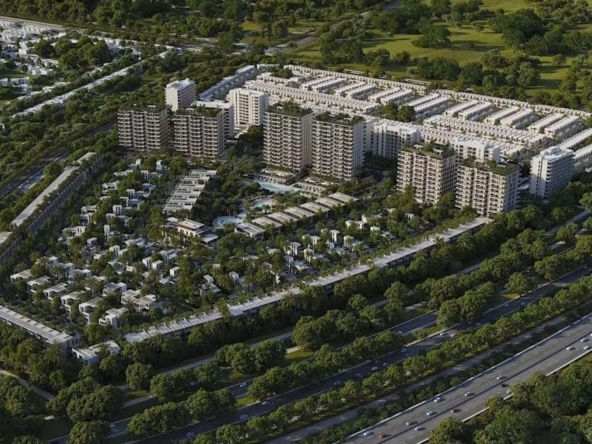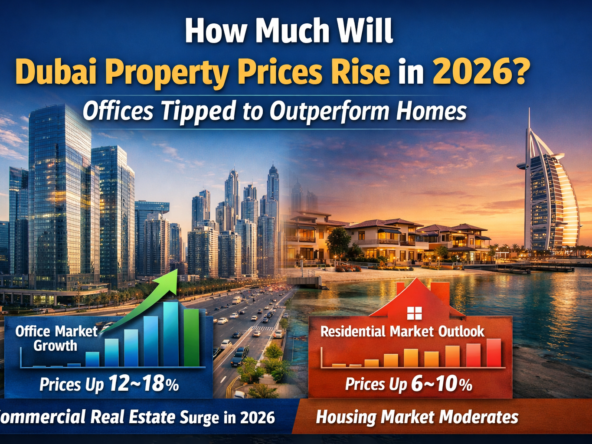The Dubai property market has once again shown its dominance in the global real estate arena, recording $37.6 billion (AED 138 billion) in total transactions during the third quarter of 2025. This marks one of the highest-performing quarters in recent years, powered primarily by a surge in off-plan property sales and a continuous influx of foreign investment.
Record-Breaking Quarter for Dubai Real Estate
According to data from the Dubai Land Department (DLD), Q3 2025 saw a year-on-year increase of nearly 20% in transaction value compared to the same period in 2024. The total number of deals crossed 36,000 transactions, indicating not just investor confidence but also a strong appetite among first-time buyers and long-term residents seeking stable returns in the Emirate’s vibrant housing market.
The robust growth underscores Dubai’s resilience amid global economic shifts. With new project launches, a steady supply of off-plan developments, and high investor interest from Europe, Asia, and the Middle East, the city’s real estate market continues to thrive as a safe-haven investment destination.
Off-Plan Sales Lead the Boom
Developers Capitalize on Investor Demand
Off-plan transactions accounted for more than 58% of total property sales in Q3 2025, marking the strongest performance in this segment since 2017. Developers such as Emaar, DAMAC, Sobha Realty, and Nakheel have rolled out a series of luxury and mid-market projects that cater to both local buyers and international investors looking for flexible payment options.
The popularity of off-plan investments stems from their affordability, structured payment plans, and potential for capital appreciation upon completion. Buyers are particularly attracted to newly launched communities like Dubai Creek Harbour, Jumeirah Village Circle, and Dubai South, where infrastructure development continues at a rapid pace.
Key Hotspots for Off-Plan Properties
The top-performing areas for off-plan sales included:
-
Dubai Marina – luxury waterfront apartments remain in high demand.
-
Business Bay – growing commercial hub with strong investor confidence.
-
Dubai Hills Estate – family-focused master community with green surroundings.
-
Palm Jebel Ali – newly relaunched mega-development drawing global attention.
These zones are not only seeing record pre-sales but also increased price appreciation, signaling long-term stability in Dubai’s residential sector.
Luxury Market Continues to Thrive
Dubai’s luxury real estate segment remains one of the most lucrative globally. Q3 2025 saw a notable rise in transactions for high-end villas and penthouses, particularly in areas like Palm Jumeirah, Emirates Hills, and Jumeirah Bay Island.
Ultra-wealthy investors from Europe, Russia, China, and India are driving demand for premium properties, viewing Dubai as both a tax-efficient investment and a secure lifestyle destination. The average luxury property price has grown by 15% year-on-year, with limited supply pushing values higher.
Developers are also adapting by introducing eco-luxury concepts, integrating smart technologies and sustainable materials to attract environmentally conscious buyers seeking long-term value.
Foreign Investment Fuels Market Growth
Global Appeal and Investor Confidence
Dubai continues to attract a diverse range of international investors. The UAE’s Golden Visa program, zero income tax, and liberal foreign ownership laws have played a pivotal role in drawing capital from global markets.
Buyers from India, the UK, Russia, China, and Pakistan remain among the top investors, while new interest has emerged from Europe and the United States, reflecting the Emirate’s expanding global appeal.
Real estate consultancy reports indicate that foreign investors now account for over 70% of total property transactions, reaffirming Dubai’s status as a cosmopolitan investment hub.
Government Initiatives Supporting Stability
The Dubai Land Department and other regulatory bodies have strengthened transparency and investor protection laws, ensuring smoother registration and ownership processes. These efforts have significantly boosted investor trust, particularly in off-plan developments, where risk management has historically been a concern.
Price Trends and Market Outlook
Steady Appreciation Across Segments
The overall price index for Dubai properties rose by 8% in Q3 2025, with apartments climbing 6% and villas increasing by 10%. Despite rising prices, the market remains more affordable than other global cities like London, Hong Kong, or New York, offering attractive yields between 5% to 7% annually.
Industry experts anticipate that prices will continue their upward trajectory into early 2026, driven by:
-
High demand for off-plan projects
-
Strong rental yields
-
Population growth and foreign migration
-
Dubai’s expanding role as a global business and tourism center
Sustained Rental Demand
Rental prices have mirrored sales trends, with an average increase of 12% year-on-year. Areas near major business districts and leisure destinations such as Downtown Dubai and Dubai Marina are leading the surge due to limited supply and high tenant retention rates.
Developers Expand Project Portfolios
Major developers are accelerating project launches to keep up with surging demand. In Q3 2025 alone, over 50 new projects were announced, including luxury towers, waterfront communities, and smart residential complexes.
Emaar’s Creek Waters, DAMAC’s Cavalli Couture, and Nakheel’s relaunch of Palm Jebel Ali exemplify the renewed developer confidence in Dubai’s long-term growth story.
These projects emphasize sustainability, digital connectivity, and integrated lifestyles, aligning with Dubai’s 2040 Urban Master Plan that envisions a greener and more livable city.
Economic and Demographic Drivers
Dubai’s booming property sector is backed by strong macroeconomic fundamentals. The Emirate’s GDP grew by 4.7% in the first half of 2025, supported by robust performance in tourism, trade, and technology sectors.
The population surpassed 3.8 million, and continued growth is expected as Dubai attracts global talent and entrepreneurs through progressive visa reforms. This demographic shift ensures consistent demand for residential properties across all income levels.
Challenges and Opportunities Ahead
While the outlook remains optimistic, analysts caution about potential supply imbalances and rising construction costs. However, Dubai’s regulatory flexibility and focus on sustainable urban development mitigate these risks.
Emerging trends such as fractional property ownership, blockchain-based title registration, and AI-driven real estate analytics are expected to further enhance transparency and efficiency in the market.
For investors, the combination of high returns, global connectivity, and regulatory stability positions Dubai as one of the most attractive property markets in the world.
Conclusion
The Dubai property market’s $37.6 billion milestone in Q3 2025 underscores its continued global dominance. With off-plan sales leading the charge, sustained investor interest, and government-backed reforms, the sector is set to maintain strong momentum into 2026 and beyond.
Dubai’s unique blend of economic resilience, visionary leadership, and investor-friendly policies continues to make it a prime destination for real estate growth — offering opportunities for both short-term gains and long-term wealth creation.




